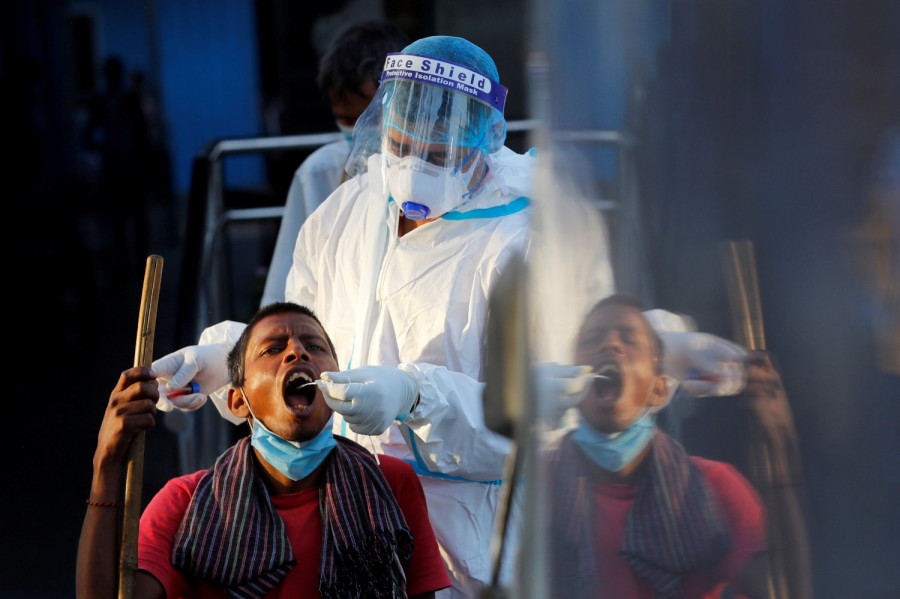Health
As India reports uptick in Covid cases, experts in Nepal urge caution
Health authorities in Kathmandu Valley are preparing to launch a campaign to administer second Covid booster shots later this month.
Post Report
With gradual increase being reported in new Covid cases in India, the Central government on Saturday requested all states and union territories to follow operational guidelines for integrated surveillance of respiratory pathogens.
According to media reports, fresh daily cases crossed 600 in India for the first time on Wednesday in 117 days.
Several states of India, including Delhi, Maharashtra, Gujarat, Tamil Nadu and Telangana recorded a surge in new cases.
Infectious disease experts as well as virologists in Nepal said that there is no need to be worried about reports of a new Covid surge in India, as last year’s surge there did not spread to Nepal. They said that authorities concerned, however, should closely monitor the infection rate in India and remain vigilant, if the new surge is caused by a new variant or sub-variant of the virus.
“We don’t know what variant is causing the new surge in India,” said Dr Prabhat Adhikari, an infectious disease expert. “We don’t need to be worried, if the virus variant causing a surge in India is the one already circulating in our country. If the virus variant is a new one, then it is a cause of concern for us.”
Some experts in Nepal said that the rise in new cases in India is a matter of concern since there is an uninterrupted cross-border movement every day. Thousands of people from both countries enter each other's territories every day. Also a large number of people choose unregulated porous borders to enter the other side.
Nepal had witnessed the second and third wave of Covid pandemic after the virus wreaked havoc in India. More than 8,000 people died of infection during the second wave of the pandemic triggered by the Delta variant, in Nepal, in 2021. Hundreds of thousands of people were infected during the third wave of pandemic caused by the Omicron variant.
“It has already been a year that many people were administered with booster shots,” said Dr Sher Bahadur Pun, a virologist, who is also the chief of the Clinical Research Unit at Sukraraj Tropical and Infectious Disease Hospital. “Health authorities should try their best to administer second booster doses at the earliest.”
Life has returned to normal in Nepal and most people seem shunning even the basic Covid safety measures such as wearing face masks, maintaining social distance and washing hands.
Doctors say even if authorities concerned cannot enforce public health safety measures strictly, they should continue the awareness drive about the risks and the importance of vaccines.
Meanwhile, health authorities in Kathmandu Valley are preparing to launch a campaign to administer second booster shots of Covid vaccine in the third week of March.
The move by health offices of all three districts—Kathmandu, Lalitpur and Bhaktapur—comes amid reports of a poor uptake of the second booster shots by members of priority groups.
The Ministry of Health and Population had started administering second booster shots some two weeks ago, after COVAX, a UN-backed international vaccine-sharing scheme, delivered 1.5 million doses of the Pfizer-BioNTech bivalent Covid vaccine to Nepal.
Health workers, pregnant women, those having compromised immunity, people suffering from chronic diseases and those above 55 years of age have been designated as priority groups for the inoculation of the bivalent Covid-19 vaccine, in the first phase.
The second booster shots are being administered from district hospitals throughout the country. In Kathmandu, vaccine doses are being administered from the hospitals of the Nepal Army, the Armed Police Force, Bir Hospital, Tribhuvan University Teaching Hospital, Sukraraj Tropical and Infectious Disease Hospital and Civil Service Hospital. The jabs are also being administered from the central office of the Nepal Red Cross Society.
Doctors say booster shots are needed to give people an added level of protection against Covid. Several studies, including the one carried out in Nepal, show that the immunity levels achieved from vaccination or natural infection wane after six months of the vaccination or natural infection.
So far, Nepal has used Covid vaccines developed by the University of Oxford and the pharmaceutical giant AstraZeneca, manufactured in various countries of Europe, India and Japan, the Chinese Vero Cell, and the US-made Janssen, Moderna, and Pfizer-BioNTech.
As many as 12,020 Covid-related deaths have been reported in Nepal, according to an official count.




 11.84°C Kathmandu
11.84°C Kathmandu














